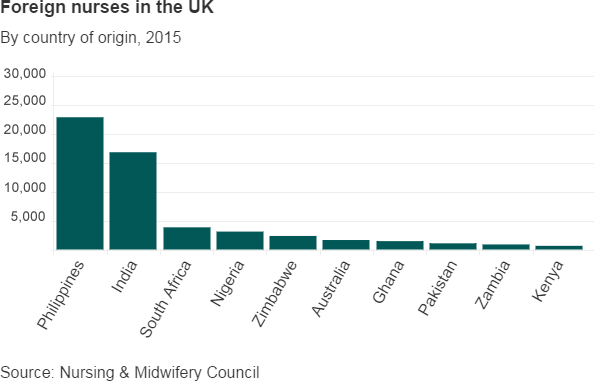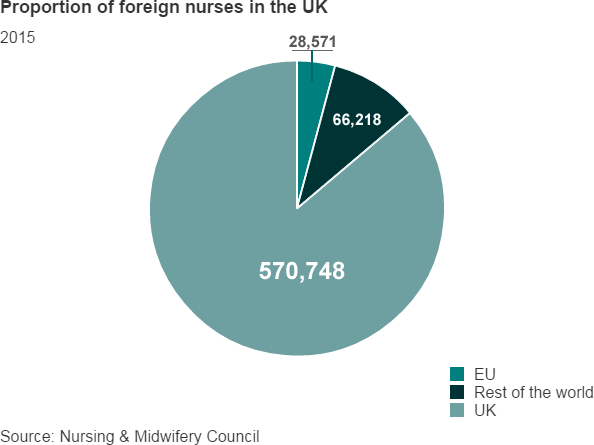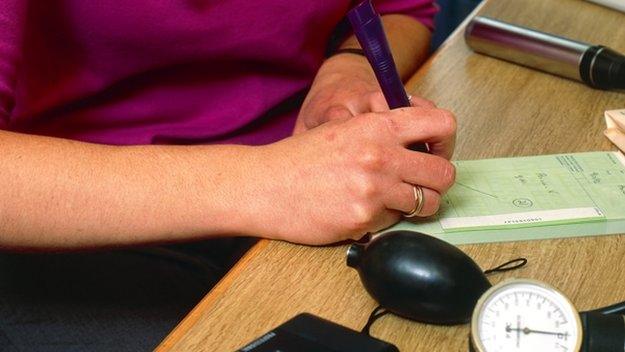Migrant salary rules may cost NHS nurse jobs, union warns
- Published
- comments
The move is part of the government's effort to control net migration, as Hugh Pym reports
Thousands of foreign nurses working in junior posts in the UK could be forced to return home under new immigration rules, union leaders have warned.
A new pay threshold for migrants means non-European workers will have to leave the UK after six years if they are not earning at least £35,000.
The Royal College of Nursing said the rules would "cause chaos" for the NHS and waste money spent on recruitment.
The Home Office said the rules would help reduce demand for migrant labour.
And Prime Minister David Cameron even got drawn into the issue, saying more homegrown nurses were in the process of being recruited.
The move is part of the government's effort to control net migration, but the union says that by 2017 more than 3,300 NHS nurses could be affected.

And by the end of the decade the numbers could be double that - a potential waste of nearly £40m when all the costs of recruitment are taken into account, the RCN says.
There are more than 400,000 nurses working in the NHS and over 600,000 registered to work.
The warning comes as the RCN's annual conference gets under way in Bournemouth.
More difficult
RCN general secretary Peter Carter said: "The immigration rules will cause chaos for the NHS and other care services.
"At a time when demand is increasing, the UK is perversely making it harder to employ staff from overseas."
He told BBC Radio 4's Today programme the move was "totally illogical" as there is currently a "major shortage of nurses", leading to many NHS trusts spending "tens of millions" to recruit from overseas.
RCN's Peter Carter: "[Foreign nurses] will have to leave their homes in the UK, many of them now have families here... it's a truly deplorable state of affairs"
Dr Carter also stressed that most nurses earn "nowhere near" £35,000, with most on salaries of between £21,000 and £28,000 a year.
Due to cuts to nurse-training places, trusts are being forced into relying on overseas recruitment as well as temporary staff just to provide safe staffing.
The long-term solution is to train more nurses in the UK, but in the interim, foreign nurses filled the gap, he added.
Source: Royal College of Nursing and NHS England
He said of the new rules: "It can't be morally or ethically right but will also have a huge impact on the ability of the health service to carry on in the way it has."
A Home Office spokesman said: "As the prime minister has made clear, the government wants to reduce the demand for migrant labour.
"We changed the settlement rules in 2011 to break the link between coming to work in the UK and staying here permanently."
He said employers had had four years to prepare for the changes, adding: "There are exemptions to this threshold where the UK has a shortage."

At the moment nurses are not on that exemption list, but the spokesman said it was possible they could still be added if evidence showed this was needed.
Meanwhile, Mr Cameron said he did not believe the immigration rules would lead to a shortfall of nurses.
"We have got a massive training programme for nurses at the moment, there are something like 8,000 more nurses in the NHS today than when I became Prime Minister. The training programme will continue," he said.
"But, crucially, we have an organisation called the Migration Advisory Committee and they advise us about which occupations to put on the so-called shortage occupations list, the ones where they fear skills shortages will develop.
"They haven't put nursing on that shortage occupation list and I think we should listen to their advice above all."

Analysis - Hugh Pym, BBC health editor
Nursing shortages and spiralling agency costs have generated intense pressures on hospital finances. Calls by regulators for higher staff numbers following scandals such as mid- Staffs have resulted in higher demand for nurses at a time of limited supply.
In effect, the RCN is saying the Government is shooting itself in the foot by pursuing a policy which could squeeze the supply of nurses even further. Making nurses from outside the European Economic Area quit the UK if they don't earn enough could deter their compatriots from seeking work here at a time of rising demand for qualified nurses in most leading economies.
The other side of the debate is the suggestion that the UK should train more homegrown nurses and not rely so much on migrant staff. The tighter immigration rules do not effect recruitment from inside the EEA so there is still a supply of trained foreign health staff. The Home Office, responsible for immigration policy, and the Department of Health, anxious to ensure there are enough nurses, will no doubt be engaged in some full and frank discussions on this vexed issue.

The Economist Intelligence Unit said any problems might be short-lived since there are now more nurse training posts in place and the Migration Advisory Committee has a system in place to identify skills shortages.
But Labour's Shadow Health Minister Andrew Gwynne said cuts to nurse training had left NHS hospitals with "no option but to recruit from overseas or hire expensive agency nurses."
And British Medical Association Dr Mark Porter, speaking at the doctor's conference which is also taking place this week, also came to the defence of people from abroad who are working in the NHS.
"What did we hear in the election campaign from politicians of several parties?
"We were told immigrants are filling up our GP surgeries and our hospitals.
"Well they are. They're called doctors. And nurses. And porters and cleaners and clinical scientists. And without them, the NHS would be on its knees."
- Published21 June 2015

- Published19 June 2015

- Published19 June 2015
- Published9 April 2015

- Published7 April 2015

- Published4 November 2014
- Published30 September 2014

- Published30 September 2014
- Published3 July 2014

- Published3 October 2013

- Published14 April 2014

- Published24 December 2013

- Published1 October 2013

- Published1 October 2013